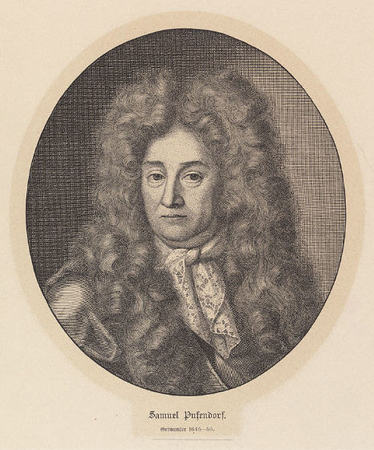Liberty Matters
Misgivings
 In my initial statement in this forum on Pufendorf I said very little in direct response to Knud Haakonssen’s lead essay. Nonetheless, without my being explicit, it probably was evident to him and could have been to any reader slightly familiar with Pufendorf that I have serious misgivings about Knud’s interpretation of the German philosopher. He admits—perhaps “parades” is the better term—that he is reading Pufendorf quite differently than is or was commonly done. Indeed, he goes so far as to say that the usual way of understanding Pufendorf as a thinker who “saw sociability as the foundation from which natural law is derived” is “an impossible way of reading him.” As a tentative and crude opening statement, let me say that I am inclined to read him in this “impossible way.”
In my initial statement in this forum on Pufendorf I said very little in direct response to Knud Haakonssen’s lead essay. Nonetheless, without my being explicit, it probably was evident to him and could have been to any reader slightly familiar with Pufendorf that I have serious misgivings about Knud’s interpretation of the German philosopher. He admits—perhaps “parades” is the better term—that he is reading Pufendorf quite differently than is or was commonly done. Indeed, he goes so far as to say that the usual way of understanding Pufendorf as a thinker who “saw sociability as the foundation from which natural law is derived” is “an impossible way of reading him.” As a tentative and crude opening statement, let me say that I am inclined to read him in this “impossible way.”Knud reads him instead in a very updated way—a Pufendorf for the 21st century. Knud’s reading is on the postmodern side. Pufendorf, according to Knud, is a nonfoundationalist: “there is no ‘foundation’ for natural law.” Knud’s Pufendorf, as Aaron Garrett rightly points out, is a “thoroughly historicist social thinker.” He is “thoroughly historicist” in that, according to Knud, “there is no room for any kind of institutionalized universal values” of the sort the law of nature usually is thought to lay out and which Pufendorf himself appeals to: “I have posited the sociality of man as the foundation of universal natural law” (emphasis added).[19] All “moral and other value argument in Pufendorf,” says Knud, is “of necessity ... historically contingent, mere prudence,” again usually thought to be quite different from natural law with its grounding in nature and its obligatory character. Reading Pufendorf in this postmodern way leads Knud to assert that “it would be a category mistake to ask whether it [Pufendorf’s theory] has truth value—i.e., whether it can be true or false—or whether it is in fact true. The relevant question [rather] is ... whether it is an effective rhetorical intervention in the world by Pufendorf.” Knud’s Pufendorf seems a sort of blend of Richard Rorty and the Cambridge school. It is Rortean in its emphasis on nonfoundationalism and rhetorical “description” or “redescription,” and it is Cambridge-like in its emphasis on historical contingency. What is radical in this interpretation is the imputation to Pufendorf of this way of understanding himself.
Or does it impute this to Pufendorf? On rereading the end of Knud’s statement I am led to wonder about how Knud understands the status of his own interpretation, and at the same time I am led to have misgivings about voicing my misgivings about Knud’s reconstruction of Pufendorf’s position. My misgivings stem from Knud’s ironizing application to himself of a postmodern perspective. “It may reasonably be asked,” he asks, “whether I think the reading of Pufendorf sketched here is true?” He admits that “to put it mildly [it is] not the only possible way of looking at the great man.” Do these other possible ways include the more traditional way that he had declared earlier to be “an impossible way”? He does not say. He does concede that there is so much stuff in Pufendorf’s massive tome that disagreement about its meaning has been common. He does not claim his to be a true construal of the great man’s thinking, but rather to be an “entertainment of ideas,” which is the appropriate intellectual stance, he believes, “as long as it seems worth entertaining—perhaps as long as it is entertaining.” In doing so, “you do not adopt the idea as true” or, I gather, put it forward as true. Given this understanding of intellectual engagement, it seems downright ham-handed to express misgivings about his construct as a true construal of Pufendorf’s thought. It would seem as out of place as a “pistol shot at the opera,” to paraphrase Stendhal. At the end of the day I am uncertain and I think Knud is rather uncertain also about what he has accomplished or even what he attempting to accomplish in putting his reading of Pufendorf forward. Is it a “category mistake” to ask of Knud’s interpretation, as he says it is to ask of Pufendorf’s theory, whether it is true?
Endnotes
[19.] See, . De Jure, Preface to First Edition, 97, in The Political Writings of Samuel Pufendorf, ed. by Craig Carr.
Copyright and Fair Use Statement
“Liberty Matters” is the copyright of Liberty Fund, Inc. This material is put on line to further the educational goals of Liberty Fund, Inc. These essays and responses may be quoted and otherwise used under “fair use” provisions for educational and academic purposes. To reprint these essays in course booklets requires the prior permission of Liberty Fund, Inc. Please contact oll@libertyfund.org if you have any questions.